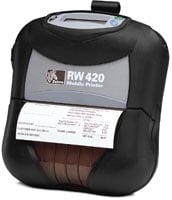Queues disappear with wireless printing solution
 Byggmax sells building materials and has premises at 27 locations in Sweden. The product range consists of base products needed for construction work e.g. timber, insulation materials, plaster and cement. They have a drive-in service, which means that the customers drive their cars into the premises and load the goods they require from the yard and the storage area, themselves. Byggmax staff register the goods in the cars, whereupon the customers are given a sales order to take to the checkout. It used to take longer, as the sales staff wrote down all items by hand on the sales order and made all calculations on a pocket calculator. At the checkout the items on the paperwork were registered together with those the customer wished to purchase from within the store. There were often problems with queues forming, when the checkout staff needed to enter all the items on the hand-written slip.
Byggmax sells building materials and has premises at 27 locations in Sweden. The product range consists of base products needed for construction work e.g. timber, insulation materials, plaster and cement. They have a drive-in service, which means that the customers drive their cars into the premises and load the goods they require from the yard and the storage area, themselves. Byggmax staff register the goods in the cars, whereupon the customers are given a sales order to take to the checkout. It used to take longer, as the sales staff wrote down all items by hand on the sales order and made all calculations on a pocket calculator. At the checkout the items on the paperwork were registered together with those the customer wished to purchase from within the store. There were often problems with queues forming, when the checkout staff needed to enter all the items on the hand-written slip.
After a six month trial period of the new system, it has been installed in all stores. The sales staff at Byggmax are equipped with handheld computers and mobile printers from Zebra Technologies. The handheld computers always have an up-to-date item register and communicate wirelessly both with the checkout environment and with the mobile printers. The sales order is printed out for the customer within one or two seconds of the goods being keyed in. There is a bar code on the slip referring to the customer (usually the registration number of the car). The checkout staff only need to scan the bar code in order to take payment for the goods, which the customer has loaded into the car. If a customer leaves the premises without having paid, the registration number can be used to contact the customer.
Saves customers’ time
“It’s quick. All items used to be entered at the checkout from hand-written paperwork. It took time and as there were many scrawls for staff to interpret there was also a greater risk of error. The whole process from the goods being loaded into the car to payment being made is much quicker now; the chaos created by a number of cars waiting to drive out hardly exists any longer. It is better for both the customers and those working here,†says Jacob Notlöv, IT manager at Byggmax.
“The program in the handheld computers is optimized for our business with the aim of minimizing the number of key presses. Furthermore, it is easier to work when it is raining. Both the handheld computers and the printers can withstand rain, unlike the paper pads that we used to use,†adds Notlöv.
The new system saves time for the customers who were previously forced to stand in long queues both at the checkout and at the exit gate. The customers already know, before arriving at the checkout, how much the goods cost as this is listed on the slip. For Byggmax staff, the job has become easier as they no longer have to write up all the goods and calculate the length of planks by hand. Furthermore, with a simple press of a button they can get information about whether a customer has or has not paid and therefore, they don’t need to check the customer’s receipt as they leave the premises. There will be a reduction in staff costs because handling is more efficient. And because there will be fewer errors and it is easier to check payments, wastage will also be reduced. In addition, the solution has a sales-increasing effect, because it is now easier for more customers to shop at the store.
The wireless and mobile printer used by Byggmax is the RW 420 from Zebra Technologies. The printer is compact and impact-resistant and has been developed to be used together with handheld computers. The software is written in Dot Net and can be used in a number of different types of handheld computers.
“It was a must for us that both the handheld computer and the printer could communicate directly with the central server environment. This feels like a future-security solution which suits us perfectlyâ€, says Jacob Notlöv.
The first installation of the system for Byggmax was made during spring 2005 and the trial has turned out very well. During September the solution was installed in Västerås, and another 25 stores will have been equipped with the new system no later than spring 2006.




